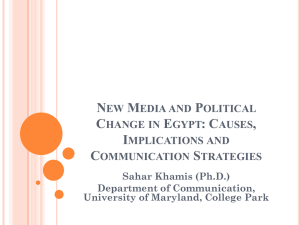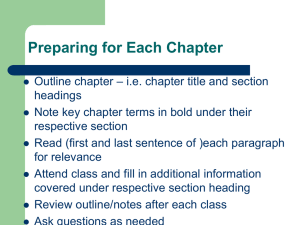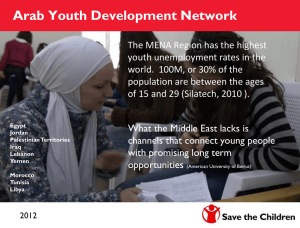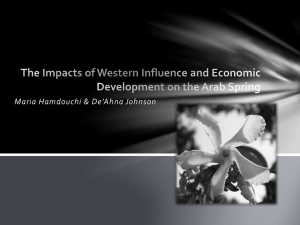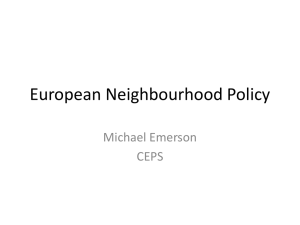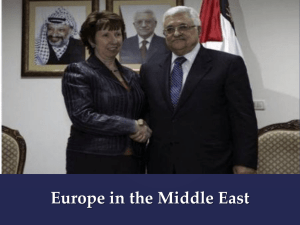Click here for syllabus - Harvard Kennedy School
advertisement
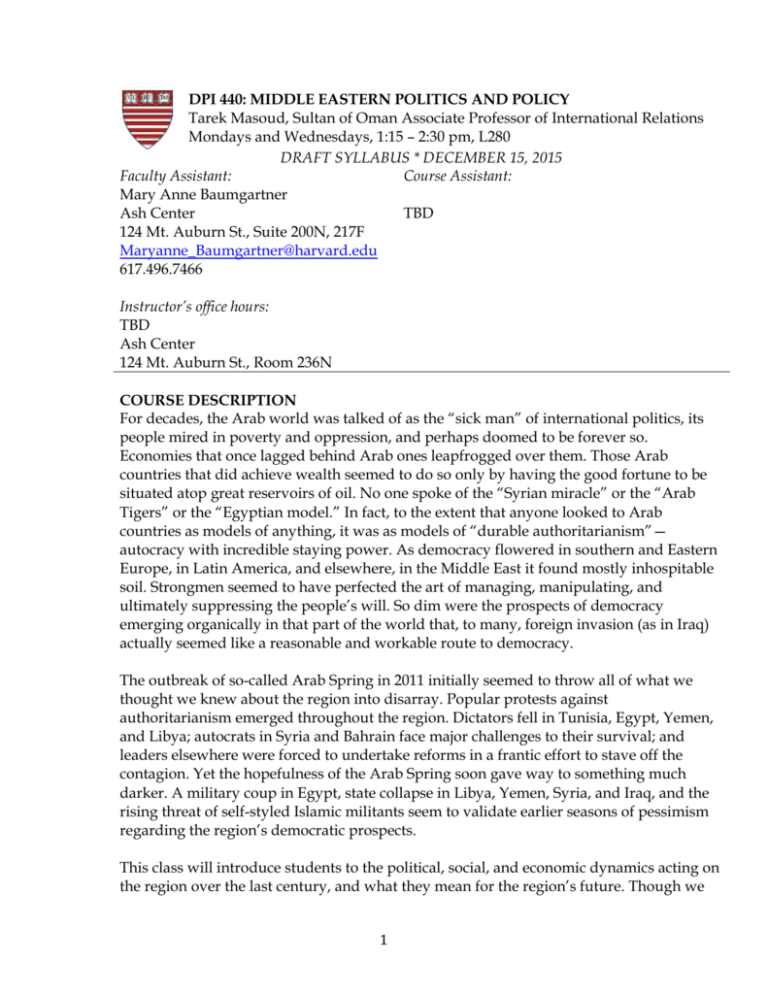
DPI 440: MIDDLE EASTERN POLITICS AND POLICY Tarek Masoud, Sultan of Oman Associate Professor of International Relations Mondays and Wednesdays, 1:15 – 2:30 pm, L280 DRAFT SYLLABUS * DECEMBER 15, 2015 Faculty Assistant: Course Assistant: Mary Anne Baumgartner Ash Center TBD 124 Mt. Auburn St., Suite 200N, 217F Maryanne_Baumgartner@harvard.edu 617.496.7466 Instructor’s office hours: TBD Ash Center 124 Mt. Auburn St., Room 236N COURSE DESCRIPTION For decades, the Arab world was talked of as the “sick man” of international politics, its people mired in poverty and oppression, and perhaps doomed to be forever so. Economies that once lagged behind Arab ones leapfrogged over them. Those Arab countries that did achieve wealth seemed to do so only by having the good fortune to be situated atop great reservoirs of oil. No one spoke of the “Syrian miracle” or the “Arab Tigers” or the “Egyptian model.” In fact, to the extent that anyone looked to Arab countries as models of anything, it was as models of “durable authoritarianism”— autocracy with incredible staying power. As democracy flowered in southern and Eastern Europe, in Latin America, and elsewhere, in the Middle East it found mostly inhospitable soil. Strongmen seemed to have perfected the art of managing, manipulating, and ultimately suppressing the people’s will. So dim were the prospects of democracy emerging organically in that part of the world that, to many, foreign invasion (as in Iraq) actually seemed like a reasonable and workable route to democracy. The outbreak of so-called Arab Spring in 2011 initially seemed to throw all of what we thought we knew about the region into disarray. Popular protests against authoritarianism emerged throughout the region. Dictators fell in Tunisia, Egypt, Yemen, and Libya; autocrats in Syria and Bahrain face major challenges to their survival; and leaders elsewhere were forced to undertake reforms in a frantic effort to stave off the contagion. Yet the hopefulness of the Arab Spring soon gave way to something much darker. A military coup in Egypt, state collapse in Libya, Yemen, Syria, and Iraq, and the rising threat of self-styled Islamic militants seem to validate earlier seasons of pessimism regarding the region’s democratic prospects. This class will introduce students to the political, social, and economic dynamics acting on the region over the last century, and what they mean for the region’s future. Though we 1 will examine some of the Arab Spring upheavals and their aftermaths in detail, we will spend most of our time discussing the past, for only by understanding the Arab past can we understand the magnitude of the challenge facing those yearning for a democratic and prosperous Arab world. We’ll pay particular attention to the counsels of pessimism in the region—scholars and writers who argued that the region was condemned to its uninviting fate by its religion, culture, natural environment, colonial past, sectarian divisions, demography, oil, or by the dark plans of foreign powers. We’ll ask what these scholars got wrong, what they got right, and what their work tells us, if anything, about what is yet to come. EXPECTATIONS, ASSIGNMENTS, GRADING, AND OTHER MATTERS This class combines lectures, discussions (both of specific cases and of conceptual issues suggested by the readings), and in-class exercises. Your full participation in class discussions is essential to making this course work. It is important that you complete the readings and come to class ready to participate, ask questions, debate with your colleagues, and contribute to our collective enterprise. Attendance is mandatory, and 20% of your grade will be based on class participation. I will do my best to make it possible for everyone in this class to participate to their full potential. Assignments: The bulk of your grade will be based on three written assignments (two 1,500 word memos and a final, 3,000-word take-home exam). Due dates and the relative share of each assignment in your overall grade are below (DATES TBD): Assignment Memo 1 Date out February XX Due February XX % of grade 20 Memo 2 February XX March XX 25 Final Exam April XX May XX 35 Please note that your final grade for the course will not be based on your absolute score on any of the graded exercises, but rather on how well you performed relative to other students in the class. The Kennedy School’s grading curve is as follows: the top 10 to 15% of the class will receive a grade of A; the next 20 to 25% will receive a grade of A-; the next 30 to 40% will receive a grade of B+; the next 20 to 25% will receive a grade of B; and the lowest 5 to 10% will receive a grade of B- or lower. Academic Honesty: It is important that you adhere to the Kennedy School’s policies regarding proper academic practice. The academic code can be found here. Please pay particular attention to the section on plagiarism, which is the appropriation of others’ words and ideas without proper attribution. The disciplinary consequences of this violation are serious, so please take care to quote and cite your sources. I will discuss strategies for avoiding plagiarism throughout the course. 2 Policy on laptops, tablets, and smart-phones: Tablets, laptops, and phones must be shut off during class. I know that this policy seems draconian, but recent research has shown that the use of these devices is detrimental to learning—not just to the learning of the students using the laptops, but also of those seated near those students. If you’ve ever been seated next to someone who is checking their email, browsing Facebook, tweeting their professor’s witty remarks, or surfing the web during lecture (due, presumably, to an absence of witty remarks), you know how distracting this can be. In order to demonstrate that this policy is not just an exercise in the capriciousness for which I am occasionally known, I’d encourage you to read the study on which it is based: http://www.yorku.ca/ncepeda/laptopFAQ.html. If you are too busy to read the study, you can read nice summaries of the findings here: http://www.cbc.ca/news/technology/laptop-use-lowers-student-grades-experimentshows-1.1401860 and here: http://www.washingtonpost.com/blogs/answersheet/wp/2013/08/20/how-distracting-are-laptops-in-class/. Readings: There are two required texts for this class: Bunton, The Palestinian-Israeli Conflict: A Very Short Introduction, Oxford 2013 Brownlee et al, The Arab Spring: Pathways of Repression and Reform, Oxford University Press, 2015. All other materials are available on the course web page. A few more things: Depending on class size, there may be assigned seating. I’m not able to post lecture slides, so please plan accordingly. You are strongly encouraged to attend the Middle East Initiative’s speaker series, the schedule of which can be found here: [insert url] SCHEDULE OF MEETINGS AND READINGS (TENTATIVE) Week 1: The Big Questions “The Tragedy of the Arabs,” The Economist, July 5, 2014 Bernard Lewis, “What Went Wrong?” The Atlantic, January 2002 Tarek Masoud, “Has the Door Closed on Arab Democracy?” Journal of Democracy, 2015 Lisa Anderson, “Arab Democracy: Dismal Prospects” World Policy Journal, 2001 Part 1: Some Old Answers Week 2: The Trouble with Islam? 3 Elie Kedourie, Democracy and Arab Political Culture, “Introduction: Democracy and the Middle Political Tradition,” pp. 1-11. David S. Landes, The Wealth and Poverty of Nations: Why Some Are So Rich and Some Are So Poor, W.W. Norton, 1998, pp. 392-421 Timur Kuran, The Long Divergence: How Islamic Law Held Back the Middle East, Princeton, 2010, pp. 279-302. Mark Tessler, “Islam and Democracy in the Middle East: The Impact of Religious Orientations on Attitudes toward Democracy in Four Arab Countries,” Comparative Politics, Vol. 34, April, 2002, pp. 337-354 Available at: http://www.jstor.org/stable/4146957 Eric Chaney, “Democratic Change in the Arab World, Past and Present,” Brookings Papers on Economic Activity, 2012 Week 3: Arab Culture Stepan and Robertson, “An ‘Arab’ More than a ‘Muslim’ Democracy Gap,” Journal of Democracy, 2003 Hisham Sharabi, Neopatriarchy: A Theory of Distorted Change in Arab Society, Oxford University Press, 1988, pp. 3-17. Available at: http://www.google.com.eg/books?id=tXtE20fVTvEC&printsec=frontcov er#v=onepage&q&f=false Abdellah Hammoudi, Master and Discipline: The Cultural Foundations of Moroccan Authoritarianism, University of Chicago Press, 1997, pp. 11-32 Raphael Patai, The Arab Mind, Hatherleigh Press, 2002, pp. 1-42 Edward Said, Orientalism, “Introduction,” pp. 1-30 Week 4: Colonialism and Foreign Intervention 4 Lisa Anderson, “The State in the Middle East and North Africa,” Comparative Politics 20 (Oct. 1987), pp. 1-18. David Fromkin, A Peace to End All Peace: The Fall of the Ottoman Empire and the Creation of the Modern Middle East, Henry Holt, 1989, pp. 493-567 Iliya Harik, “The Origins of the Arab State System,” International Spectator, vol. 20, no. 2, April 1985, pp 20-32. Amaney Jamal, “Chapter 2: Jordan and Kuwait: The Making and Consolidating of US Client Regimes” in Of Empires and Citizens: ProAmerican Democracy or No Democracy At All? Princeton University Press 2012. Lisa Anderson, “Peace and Democracy in the Middle East: The Constraints of Soft Budgets,” Journal of International Affairs, 49:1, pp. 819832. Available at: http://ezpprod1.hul.harvard.edu/login?url=http://search.ebscohost.com/login.asp x?direct=true&db=mth&AN=9509230297&site=ehost-live&scope=site Ian Lustick, “The Absence of Middle Eastern Great Powers: Political ‘Backwardness’ in Historical Perspective,” International Organization, Vol. 51, No. 4, 1997, pp. 653-683. Available at: http://web.ebscohost.com.ezpprod1.hul.harvard.edu/ehost/pdf?vid=3&hid=7&sid=49d11384-b2cc4be7-991d-af2cb5e50241%40sessionmgr2 Excerpt from Zaid al-Ali, The Struggle for Iraq’s Future: How Corruption, Incompetence, and Sectarianism Have Undermined Democracy, Yale University Press, 2014 Week 5: Oil Wealth and the Politics of the Rentierism Jill Crystal, Oil and Politics in the Gulf: Rulers and Merchants in Kuwait and Qatar, Cambridge University Press, 1995, pp. 36-109 Michael L. Ross, “Does Oil Hinder Democracy?” World Politics. April 2001. Available at http://muse.jhu.edu.ezpprod1.hul.harvard.edu/journals/world_politics/v053/53.3ross.pdf Michael Herb, “No Representation without Taxation? Rents, Development, and Democracy,” Comparative Politics, April 2005, 297-316 http://www2.gsu.edu/~polmfh/herb_rentier_state.pdf Stéphane Lacroix, “Is Saudi Arabia Immune?” Journal of Democracy (22:4, 2011). Week 6: Authoritarian Statecraft 5 Nazih Ayubi, Over-stating the Arab State: Politics and Society in the Middle East, I.B. Tauris, 2008, pp. 447-459 [in packet] Eva Bellin, “The Robustness of Authoritarianism in the Middle East: A Comparative Perspective,” Comparative Politics, vol. 36, no. 2, pp. 139-157. Jan, 2004. Available at http://ezpprod1.hul.harvard.edu/login?url=http://www.jstor.org/stable/4150140 James T. Quinlivan, “Coup-proofing: Its Practices and Consequences in the Middle East,” International Security, Vol. 24, No. 2, 1999, pp. 131-165. Available at: http://ezpprod1.hul.harvard.edu/login?url=http://www.jstor.org/stable/2539255 Larry Diamond, “Why are there no Arab democracies?” Journal of Democracy, January 2010 Martha Pripstein-Posusney, “Multi-party elections in the Arab world: Institutional engineering and oppositional strategies,” Studies in Comparative International Development, vol. 36, no. 4, December 2002, pp. 34-62 Hugh Roberts, “Algeria: The Subterranean Logics of a Non-election,” Real Instituto Elcano, 4/22/2009. I. William Zartman, “Opposition as Support of the State,” in Giacomo Luciani, ed. The Arab State, Routledge, 1990, p. 220-247 Steven Heydemann, “Upgrading Authoritarianism in the Arab World,” Brookings Institution, 2007. http://www.brookings.edu/papers/2007/10arabworld.aspx Ellen Lust-Okar, Structuring Conflict in the Arab World: Incumbents, Opponents, and Institutions, Cambridge University Press, 2005, pp 37-95. Lisa Blaydes, “Elections and Elite Management,” in Elections and Distributive Politics in Mubarak’s Egypt, Cambridge University Press, 201, pp. 48-64 Tarek Masoud, “Chapter 2: Clientelism and Class: The Tragedy of Leftist Opposition in Mubarak’s Egypt” in Counting Islam: Religion, Class, and Elections in Egypt, Cambridge University Press, 2014. ****MEMO 1 ASSIGNED AT THIS POINT Part 2: Contemporary Challenges Week 7: Political Islam I 6 Albert Hourani, Arabic Thought in the Liberal Age: 1798-1939, Cambridge University Press, 1983, pp. 67-192 Available at: http://hdl.handle.net.ezpprod1.hul.harvard.edu/2027/heb.00896 Richard P. Mitchell, The Society of Muslim Brothers, Oxford University Press, 1993, pp. 1-35 Available at: http://hdl.handle.net.ezpprod1.hul.harvard.edu/2027/heb.00919 Mona El-Ghobashy, “The Metamorphosis of the Egyptian Muslim Brothers,” International Journal of Middle East Studies, Vol. 37, No. 3, 2005, pp. 373-395. Available at: http://journals.cambridge.org/action/displayAbstract?aid=322987 Carrie Rosefsky Wickham (2004). “The Path to Moderation: ... Learning in the Formation of Egypt's Wasat Party,” Comparative Politics, vol. 36, no. 2 Jillian Schwedler, 2011 “Can Islamists Become Moderates? Rethinking the Inclusion-Moderation Hypothesis,” World Politics 63(2): 347-76 Tarek Masoud, “Islamist Parties: Are they democrats? Does it Matter?” Journal of Democracy, July 2008. Sayyid Qutb, Milestones, 1964. Introduction, chapters 3, 4, and 5. Available at: http://majalla.org/books/2005/qutb-nilestone.pdf Week 8: Political Islam II Osama bin Laden, “Declaration of War Against the Americans Occupying the Land of the Two Holy Places,” August, 1996. Available at: http://www.pbs.org/newshour/terrorism/international/fatwa_1996.ht ml Graeme Wood, “What ISIS Really Wants,” The Atlantic, March 2015 Thomas Hegghammer, “Terrorist Recruitment and Radicalization in Saudi Arabia,” Middle East Policy (2006) Sayyid Qutb, “The America I Have Seen: In the Scale of Human Values,” in Kamal Abdel-Malek, ed., America in an Arab Mirror: Images of America in Arabic Travel Literature, St. Martin’s, 2000, pp. 10-27 [in packet] Saad Eddin Ibrahim, “Anatomy of Egypt’s Militant Islamic Groups: Methodological Note and Preliminary Findings,” International Journal of Middle East Studies, vol. 12, no. 4, 1980, pp. 423-453. Available at: http://ezpprod1.hul.harvard.edu/login?url=http://www.jstor.org/stable/163128 ****MEMO 1 DUE Week 9: The Arab Spring I 7 Rabab al-Mahdi, “Enough! Egypt’s Quest for Democracy,” Comparative Political Studies, August 2009, pp. 1011-1039 Dina Shehata, “Youth Activism in Egypt,” Arab Reform Brief, October 2008. http://www.arabreform.net/sites/default/files/ARB.23_Dina_Shehata_ENG.pdf Laryssa Chomiak, “The Making of a Revolution in Tunisia,” Middle East Law and Governance, 2011, pp. 68-83 Zeynep Tufekci and Christopher Wilson, “Social Media and the Decision to Participate in Political Protest: Observations From Tahrir Square,” Journal of Communication, 62:2, April 2012, pp. 363-379 Masoud, “The Road to and from Liberation Square,” Journal of Democracy, July 2011 Zoltan Barany, “The Role of the Military,” Journal of Democracy, 22:4, October 2011 Yom and Gause, “Resilient Royals: How Arab Monarchies Hang On,” Journal of Democracy, 23:4, October 2012 Week 10: The Arab Spring II Brownlee, Masoud, Reynolds, “Why the Modest Harvest?” Journal of Democracy, October 2013 Eva Bellin, “Drivers of Democracy: Lessons from Tunisia,” Crown Center for Middle East Studies, Brandeis University, August 2013. Available online. Brownlee, Masoud, and Reynolds, The Arab Spring: Pathways of Repression and Reform, Oxford University Press, 2015, chapters 4 and 5 ****MEMO 2 ASSIGNED AT THIS POINT Week 11: The Arab Israeli Crisis Martin Bunton, The Palestinian-Israeli Conflict: A Very Short Introduction, Oxford 2013 Marilyn Grobschmidt and Mark Tessler, “Democracy in the Arab World and the Arab-Israeli Conflict,” in David Garnham and Mark Tessler (eds), Democracy, War, and Peace in the Middle East, Indiana University Press, 1995, pp. 135-169 Week 12: Selected topics Gender: 8 Mounira Charrad, “State and Gender in the Maghrib,” Middle East Report, No. 163, March-April 1990, pp. 19-24 Saba Mahmood, “Chapter 1: The Subject of Freedom,” in The Politics of Piety: The Islamic Revival and the Feminist Subject, Princeton University Press 2011. Michael L. Ross “Oil, Islam, and Women,” American Political Science Review, Vol. 102. No. 1 Feb 2008. Available at http://journals.cambridge.org/production/action/cjoGetFulltext?fulltext id=1720696 Sectarianism: Madawi Al-Rasheed, “Sectarianism as Counter-Revolution: Saudi Responses to the Arab Spring,” Studies in Ethnicity and Nationalism (11:3, 2011) Vali Nasr, The Shia Revival: How Conflicts within Islam Will Shape the Future, W.W. Norton, 2006, pp. 227-254 F. Gregory Gause III, “Beyond Sectarianism: The New Middle East Cold War,” Brookings. Usama Makdisi, “Reconstructing the Nation State: The Modernity of Sectarianism in Lebanon,” Middle East Report, 200, Summer 1996, pp. 23-26 Water: Mounir Belloumi and Mohamed Salah Matoussi, “Water Scarcity Management in the MENA Region from a Globalization Perspective,” Development, 51, 2008, pp. 135-138. Ashok Swain, “Ethiopia, the Sudan, and Egypt: The Nile River Dispute,” Journal of Modern African Studies, vol. 35, 1997, pp. 675-694 Jeannie Sowers, “Natural Reserves and Authoritarian Rule in Egypt: Embedded Autonomy Revisited,” Journal of Environment and Development, vol. 16, no. 4, pp. 375-397 ****MEMO 2 DUE Week 13: Wrap up Lisa Wedeen, “The Politics of Deliberation: Qat Chews as Public Spheres in Yemen,” Public Culture 19:1, 2007. Charles Kurzman, “Not Ready for Democracy? Theoretical and Historical Objections to the Concept of Prerequisites, “ Sociological Analysis, December 1998. Available at: http://www.unc.edu/~kurzman/cv/Kurzman_Not_Ready_for_Democr acy.pdf 9 10

